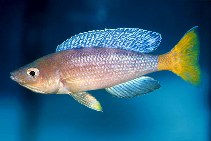| Family: |
Cichlidae (Cichlids), subfamily: Pseudocrenilabrinae |
| Max. size: |
11 cm TL (male/unsexed) |
| Environment: |
benthopelagic; freshwater; pH range: 8 - 9; dH range: 9 - 19 |
| Distribution: |
Africa: Endemic to Lake Tanganyika. |
| Diagnosis: |
Dorsal spines (total): 12-13; Dorsal soft rays (total): 15-16; Anal spines: 3-3; Anal soft rays: 10-12; Vertebrae: 35-37 |
| Biology: |
Gregarious, adults occur off rocky slopes. 'Headstanders', often remain still with the head low. Drifting zooplankton feeders, but also feed on shellfish (Ref. 6770). Females brood their young in the mouth (Ref. 86760). |
| IUCN Red List Status: |
Least Concern (LC); Date assessed: 31 January 2006 Ref. (130435)
|
| Threat to humans: |
harmless |
Source and more info: www.fishbase.org. For personal, classroom, and other internal use only. Not for publication.

